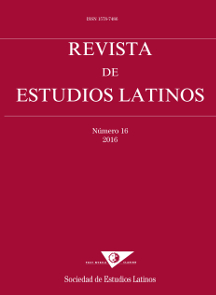Umbra feralis exercitus: ejércitos fantasma en la historia de Roma
DOI:
https://doi.org/10.23808/rel.v16i0.82781Palabras clave:
ejércitos fantasma; prodigios; literatura romana; historia romana.Resumen
El presente trabajo analiza el desarrollo del motivo de los ejércitos fantasma en la narración de hechos concernientes a la historia de Roma. Para ello, se ha recurrido a una serie de autores y textos que incluyen dicho motivo para procurar establecer las características de este, los referentes religiosos y culturales así como su función literaria y los posibles paralelismos entre textos.
Descargas
Citas
Bernstein, A.E. (2009): “The ghostly troop and the battle over death: William of Auvergne”, en Poo, M. (ed.), Rethinking ghosts in world religions, Leiden-New York, Brill, 115-162.
Bernstein, N. (2012): “The dead and their ghosts in the Bellum Civille: Lucan’s visions of history”, en Asso, P. (ed.), Brill’s Companion to Lucan, Leiden-New York, Brill, 257-282.
Bloch, R. (1963): Les prodiges dans l’Antiquité, Paris, Presses Universitaires de France.
Boyancé, P. (1963): La réligion de Virgile, Paris, Presses Universitaires de France.
Brenk, F. (1986): “In the light of the moon. Demonology in Early Imperial period”, ANRW 2.16.3, 2107-2116.
Brenk, F. (1988): “Cassius ‘Epicurean’ explanation of Brutus vision in Plutarch Broutos”, en Gallo, I. (ed.), Aspetti dello stoicismo e dell’epicureismo in Plutarco, Ferrara, Giornale filologico ferrarese, 109-118.
Catrein, C. (2002): Vertauchte Sinne. Untersuchungen zur Synästhesie in der römischen Dichtung, Leipzig, De Gruyter.
Chassignet, M. (1996): L’Annalistique romaine: Tome I. Les Annales des pontifes et l’annalistique ancienne, Paris, Les Belles Lettres.
Crivăţ, A. (2011): “El léxico de lo extraordinario en las Etimologías de Isidoro de Sevilla (portenta, ostenta, prodigia, monstra)”, Revue roumaine de linguistique 56, 4, <http://www.lingv.ro/RRL-2011.html> [29/08/2016].
Davies, J. P. (2004): Rome’s Religious History: Livy, Tacitus and Ammianus on their Gods, Cambridge, Cambridge University Press.
Delgado, J.A. (2002): “Miedo al rayo, expiación y el problema de los “sacerdotes bidentales” en la religión romana”, en Díez de Velasco, F. P. (coord.), Miedo y religión, La Laguna, Ediciones del Orto, 245-256.
Dillery, J., (2002): “Quintus Fabius Pictor and Greco-Roman historiography at Rome”, en Miller, J.F., Damon, C., Myers, K.S. (eds.), Vertis in usum: Studies in Honor of Edward Courtney, Múnich, De Gruyter, 1-23.
Feeney, D. (1998): Literature and Religion at Rome: Cultures, Contexts, and Beliefs, Cambridge, Cambridge University Press.
Feeney, D. (2011): “The history of Roman religion in Roman Historiography and Epic”, en Rupke, J. (ed.), Companion to Roman Religion, Oxford, Oxford University Press, 129-143.
Fevrier, C. (2006): “Du prodige en poésie. Variations sur un thème épique”, en Chassignet, M., Champeaux, J. (eds.), Aere perennius: en Hommage à Hubert Zehnacker, París, Presses de l’université Paris-Sorbonne, 417-432.
Frier, B. W. (1979): Libri Annales Pontificum Maximorum: The Origins of the Annalistic Tradition, Roma, American Academy in Rome, 1979.
Gladhill, B. (2012): “Gods, Caesars and Fate in Aeneid 1 and Metamorphoses 15”, Dyctinna 9, <http://dictynna.revues.org/820> [21/08/2016].
Guzmán Almagro, A. (2013): “Fórmulas exorcísticas en la narrativa sobrenatural grecorromana”, MHNH 13, 15-32.
Guzmán Almagro, A. (2014): “¿Taciti manes? Fantasmas vivos y fantasmas parlantes”, Viator, 357-372.
Händel, P. (1959): “Prodigium”, RE 23.2, 2283-2286.
Jiménez Delgado, J. (1961): “La importancia del prodigio en Tito Livio”, Helmantica 12, 27-46.
Krauss, F.B. (1930): An interpretation of the omens, portents and prodigies recorded by Livy, Tacitus and Suetonius, Filadelfia, University of Pennsylvania.
Lecouteux, C. (1999): Les Chasses fantastiques et les cohortes de la nuit, Paris, Imago.
Lendon, J. E. (2006): Soldiers and ghosts: a history of Battle in Classical Antiquity, New Haven, Yale University Press.
Levene, D. S. Nelis, D. P. (2002): Clio and the Poets: Augustan Poetry and the Traditions of Ancient Historiography, Leiden, Brill.
Littlewood, J.L. (2011): A Commentary on Silius Italicus’ Punica 7, Oxford, Oxford University Press.
McBain, B. (1982): Prodigies and Expiation: A Study in Religion and Politics in the Roman Republic, (Collections Latomus 167), Bruselas, Latomus.
Mastandrea, P. (2005): Giulio Ossequente. Prodigi. Introduzione e testo di Paolo Mastandrea. Traduzione e note di Massimo Gusso, Milán, Oscar Mondadori.
Mastrosa, I.G. (2012): “Calamità e prodigi nella storia di Roma repubblicana: la rilettura tardoantica di Orosio”, Rursus 8 < https://rursus.revues.org/1084> [21/08/2016].
Narducci, E. (2002): Lucano. Un’epica contro l’Impero, Bari, Laterza.
Rasmussen, S. W. (2003): Public portents in Republican Rome, Roma, Analecta Romana Instituti Danici ( Suppl. 34).
Rawson, E. (1971): “Prodigy Lists and the Use of the Annales Maximi”, The Classical Quarterly 2, 21.1, 158-169.
Requena, M. (2006): “Nerón y los manes de Agripina”, Historiae 3, 83-108.
Rocca, S. (1978): Iulii Obsequentis Lexicon, Génova, Pubblicazioni dell’Istituto di Filologia Classica e Medievale.
Santini, C. (1988): “Letteratura prodigiale e sermo prodigialis in Giulio Ossequente”, Philologus 132, 210-226
Schmitt, J. C. (1994): Les revenants. Les vivants et les morts dans la société médiévale, París, Gallimard.
Schneider, C. (2011): Paranormale Antiquité. La mort et ses démons en Grèce et à Rome, París, Les Belles Lettres.
Stramaglia, A. (1998): Res inauditae, incredulae, storie di fantasmi nel mondo greco-latino, Bari, Levante Editori.
Vigourt, A. (2001): Les Présages impériaux d’Auguste à Domitien, París, Éditions de Boccard.
Weniger, L. (1906): “Feralis exercitus”, Archiv für Religionswissenschaft 9, 201-241.
Winkler, J. (1980): “Lollianos and the ‘Desperadoes’”, The Journal of Hellenic Studies 100, 155-181.
Wiseman, T.P. (2002): “History, poetry and annals”, en Levene, D.S., Nelis, D. P. (edd.), Clio and the Poets: Augustan Poetry and the Traditions of Ancient Historiography, Leiden-New York, Brill, 331-362.
Wittmann, R. (1968): “Flying saucers or flying shields”, Classical Journal 63, 223-226.
Wulker, L. (1903): Die geschichtliche Entwicklung des Prodigienwesens bei den Römern, Leipzig (Tesis doctoral disponible on-line, enlace: <https://archive.org/stream/diegeschichtlich00wlke/diegeschichtlich00wlke_djvu.txt>) [20/09/2016].
Descargas
Publicado
Cómo citar
Número
Sección
Licencia
Derechos de autor 2016 Revista de Estudios Latinos

Esta obra está bajo una licencia internacional Creative Commons Atribución-NoComercial-SinDerivadas 4.0.
Los originales publicados en las ediciones impresa y electrónica de esta revista son propiedad de las personas autoras de los mismos y se podrán difundir y transmitir siempre que se identifique la fuente original y la autoría en cualquier reproducción total o parcial de los mismos, y siempre que no tengan una finalidad comercial.






